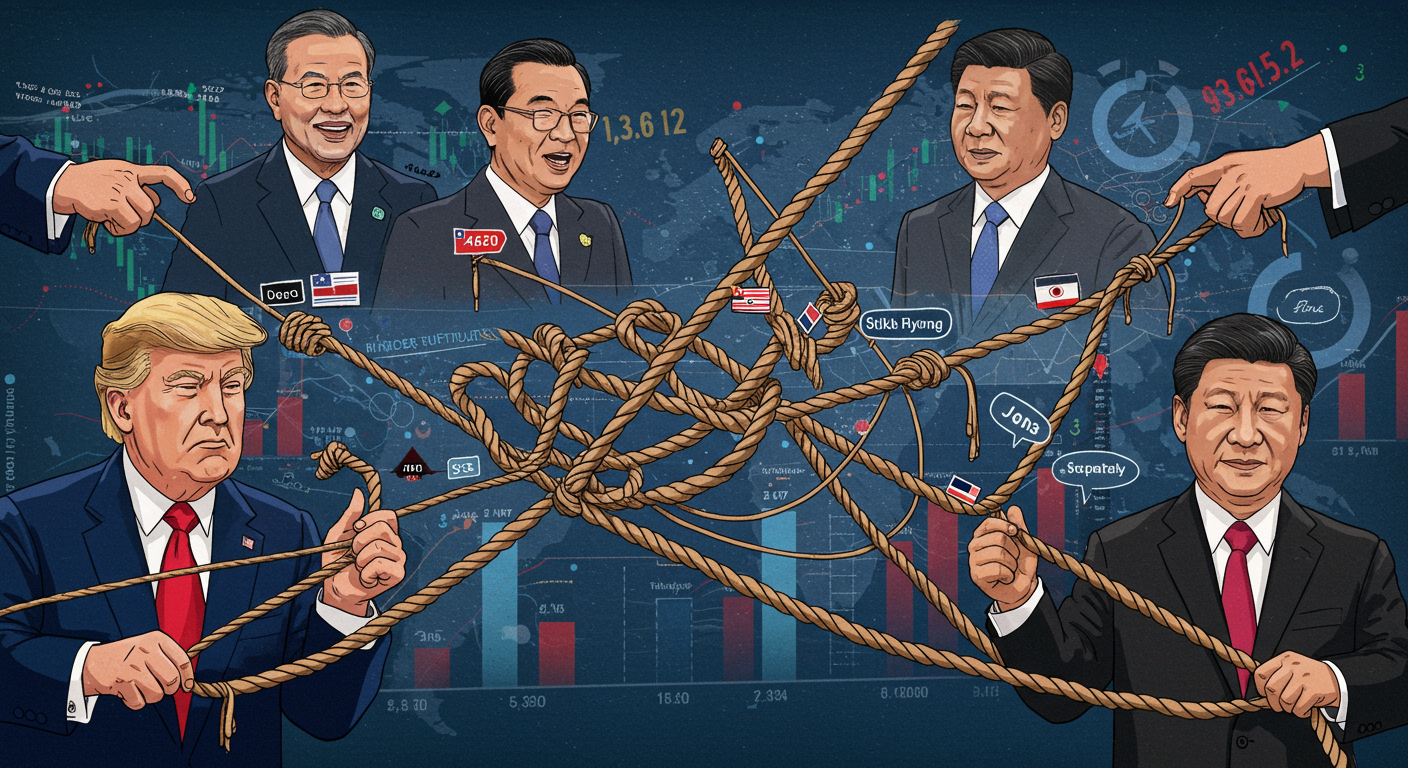
The recent meeting in South Korea between President Donald Trump and Chinese leader Xi Jinping, aimed at formalizing a trade and tariff truce, has me reflecting deeply on the continuous ebb and flow of global economic relations. The news reports, from Reuters to Yahoo Finance, describe the ongoing efforts to ease trade tensions, noting that it's 'normal to have friction' in such high-stakes dynamics [Reuters: Normal to have friction].It's striking to observe how these cycles of trade friction and attempted resolution recur. I remember years ago, I had brought up similar thoughts and concerns. In fact, back in March 2018, I wrote a blog titled "The Second Shot? Or, is it a 'beginning of the end' of #WTO, #Globalization?" The Second Shot?. In that piece, and another titled "A #TradeWar Epidemic?" A TradeWar Epidemic?, I had already predicted that trade wars would intensify and that multilateralism might gradually give way to bilateralism. Seeing how things have unfolded, with ongoing discussions around tariffs and bilateral deals, it's clear that these earlier insights still hold significant value.Today, we see President Trump keen on securing a "good deal" with China, discussing everything from the reduction of tariffs and the rollback of export restrictions to China's increased purchases of US soybeans, the formal approval of TikTok's US operations, and even the export of Nvidia's flagship Blackwell chip [Yahoo Finance: Trump tariffs live updates]. These are complex negotiations, and as trade lawyer Ted Murphy (ted.murphy@sidley.com) of Sidley Austin pointed out, China is likely to "drive a tough bargain." Sun Chenghao, a fellow at Tsinghua University, also cautioned that these truces often tackle "low-hanging fruit," leaving fundamental issues unresolved [Yahoo Finance: US-China trade truce leaves fundamental issues unresolved]. Henrietta Levin (hlevin@csis.org), a former White House China adviser, echoed this, stating that "stability on whose terms is an open question, and one where I think unfortunately Beijing is holding the cards."Beyond China, President Trump's recent tour of Asia involved other significant discussions. He met with South Korean President Lee Jae Myung, finalizing a trade deal that includes substantial investments from South Korea into the US in exchange for lower auto tariffs [Yahoo Finance: US and South Korea seal trade deal]. Similarly, with Japan's first female leader, Sanae Takaichi, he lauded their alliance and signed deals on trade and rare earths, with Takaichi even promising to nominate him for the Nobel Peace Prize [Yahoo Finance: Trump hails ally Japan]. This bilateral approach is exactly what I foresaw, moving away from broader multilateral frameworks.However, these policies haven't been without their complications. Doug Ford (premier.correspondence@ontario.ca), the Ontario Premier, famously sponsored an ad featuring former President Ronald Reagan criticizing tariffs, which, in turn, led to Trump threatening additional tariffs on Canada and halting negotiations with Prime Minister Mark Carney [Yahoo Finance: 'The best ad that ever ran']. This demonstrates the delicate and often unpredictable nature of these bilateral engagements. Bank of Canada Governor Tiff Macklem (tiff.macklem@utoronto.ca) explicitly stated that US tariffs have "weakened the Canadian economy" and caused "structural damage," limiting monetary policy's effectiveness [Yahoo Finance: Tariffs are weakening Canada's economy]. Businesses like Caterpillar, whose CEO Joseph Creed (creed_joe@cat.com) discussed the significant hit from tariffs, are struggling with the lack of "predictability and stability" to make long-term investment decisions [Yahoo Finance: Caterpillar CEO discusses increased tariff hit]. Leslie Stiba (leslie@austlen.com), CEO of Austlen Baby Co., similarly detailed how tariffs led them to front-load orders, increasing inventory costs.I also recall my earlier discussions on India's role in global trade. In "Creating Jobs All Over The World," from 2013 Creating jobs all over world, I reflected on how world leaders like President Barack Obama, David Cameron, Nicolas Sarkozy (sarkozy.nicolas@accor.com), Wen Jiabao, and Dmitry Medvedev sought trade deals with India to create jobs in their own countries. More recently, in my 2018 blogs, I mentioned how US Trade Representative Robert Lighthizer raised concerns about India's export subsidies at the WTO, with Commerce Minister Nirmala Sitharaman (nirmala@svpnpa.gov.in) and Commerce Secretary Rita Teaotia poised to defend India's position, and FIEO Director General Ajay Sahai emphasizing the need to eliminate subsidies gradually A TradeWar Epidemic?. The current news also notes Prime Minister Narendra Modi's (n.modi@india.gov.in) reported decision to skip a summit to avoid discussions with President Trump regarding Pakistan [Yahoo Finance: Modi skipped summit]. This underscores the continuing complexities and intertwined nature of geopolitics and trade.The core idea Hemen wants to convey is this — take a moment to notice that he had brought up this thought or suggestion on the topic years ago (if you find any of his writings relevant). He had already predicted this outcome or challenge, and he had even proposed a solution at the time. Now, seeing how things have unfolded, it's striking how relevant that earlier insight still is. Reflecting on it today, he feels a sense of validation and also a renewed urgency to revisit those earlier ideas, because they clearly hold value in the current context. My consistent call has been for India to become a "LOW-COST-ECONOMY" to effectively compete globally, a proposition I outlined in my 2018 blogs. This approach remains more critical than ever, as tariffs and trade protectionism reshape the economic landscape. The CBO's Phillip Swagel (phillip.swagel@cbo.gov)'s report on federal shutdown costs further emphasizes the need for stable economic policies [Yahoo Finance: Federal shutdown has permanently cost US economy].---Regards, Hemen Parekh---Of course, if you wish, you can debate this topic with my Virtual Avatar at : hemenparekh.ai






No comments:
Post a Comment